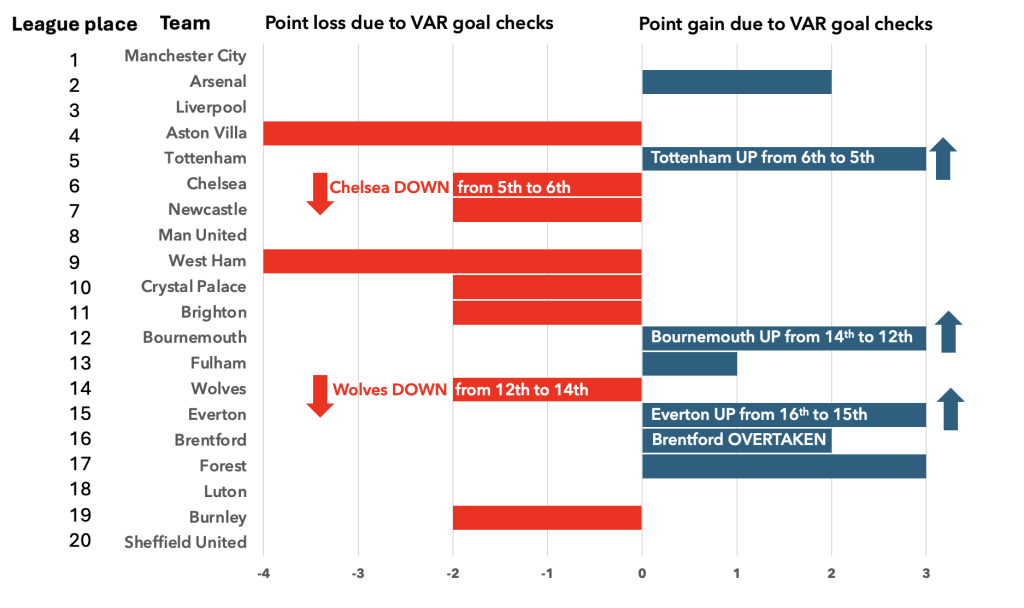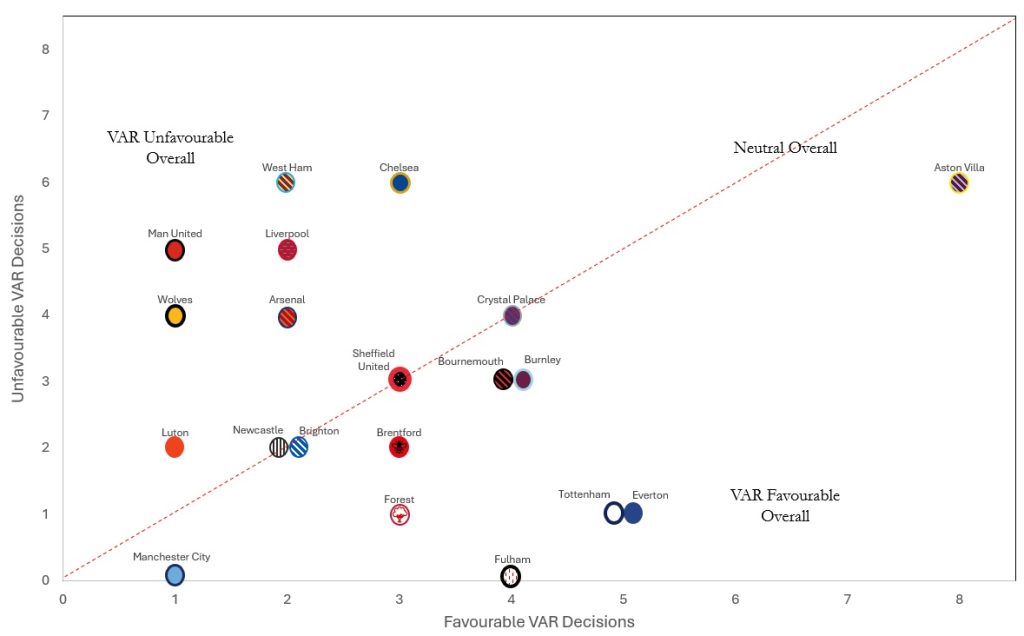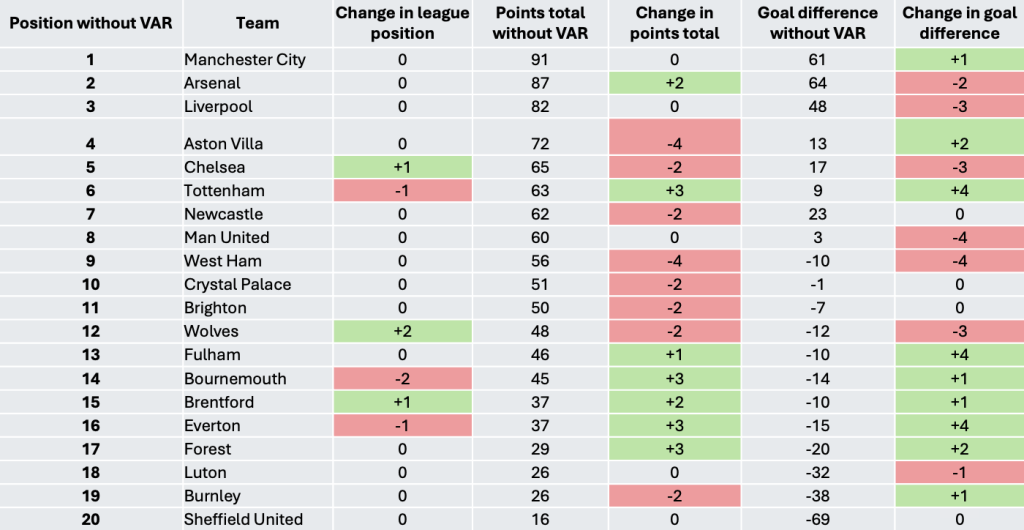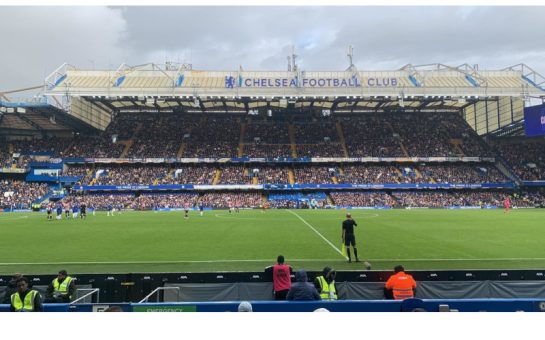VAR goal checks in the 23/24 Premier League season may have cost Chelsea millions of pounds in Europa League revenue.
One of the most common uses of VAR is to check goals in order to allow or disallow them.
Data shows if this function was removed, six clubs would have ended the 23/24 season in different positions – including Chelsea, who would have finished in a UEFA Europa League spot, knocking London rivals Tottenham down to the UEFA Europa Conference League.

By dropping out of the Europa League, Chelsea lost out on millions in revenue. Clubs that qualify for Europa League instead of the Europa Conference League not only receive a greater qualification bonus (£3.2 million versus £2.5 million), but they also receive a share of €139.5 million in TV revenue. In the Europa Conference League, the pot for TV revenue is just €23.5 million.
Chelsea fan Luke Smythe, a member of the Berkshire Blues supporters’ club, said: “I hope VAR is abolished. I feel like whenever a goal is scored there’s this agonising wait to see whether it will be allowed.
“The decisions take too long, and the time taken can really affect the impetus of the game. If a side is in a good patch of play, the delay can alter that. I prefer to trust the ref on the pitch, and any perceived unfairness will balance out in time.”
What about fan experience?
One common criticism of VAR is that it compromises the fan experience: after all, no one likes having to delay their celebrations for time-consuming checks. The average VAR check takes 38 seconds – although this won’t be much consolation to fans at West Ham vs Aston Villa game on March 17, when one VAR check took a record breaking five minutes and 37 seconds.
VAR was used to disallow or allow goals in 57 games this season (15% of the 380 games played), with the average club experiencing a delay for a VAR goal check in six of their games.
Aston Villa fans witnessed the most VAR goal interventions, with these taking place in 12 of their games – double the average.
Manchester City saw the fewest VAR goal interventions, with just one check during the 23/24 season.
Does VAR make games less exciting?
While its defenders may claim that checks aren’t as time consuming as people feel, some of the animosity towards VAR may derive from the fact that it’s overwhelmingly used to disallow goals.
In the 23/24 season, VAR was used to disallow 53 goals and to allow just seven, meaning that without it football fans could have expected to celebrate 46 more goals.
This is a small but respectable 3.8% increase on the 1,209 total goals scored in the Premier League this season.
For every fan upset about having a goal disallowed, though, there’s a set of opposing fans who are relieved.
Manchester City fan Jill Peterson, a data analyst, said: “I personally like VAR. I think it adds some excitement to the match – the tension while you wait. Plus it gives you a chance to form your own opinion on the outcome if you’re watching on TV, because you see all the angles like the ref does.
“I do see that it can slow the game down, but I don’t mind that if it prevents unfair decisions. Also, there’s nothing better than seeing a rival goal get chalked off!”
VAR winners and losers
For seven clubs, VAR goal checks had an unfavourable effect overall. For four clubs, it was neutral, while for the nine remaining clubs, it was favourable overall.

Aston Villa had the most to celebrate last season, with eight decisions going their way, while West Ham and Chelsea were disappointed most often, receiving six unfavourable decisions apiece.
In terms of balance, Manchester United were the biggest losers this season, receiving five unfavourable decisions but just one favourable decision in return. By contrast, Tottenham and Everton received five decisions in their favour, with only one going against them.
Is it all worth the fuss?
Conversations about VAR loom large in the Premier League.
But how much of a difference does it actually make?
Manchester United had the worst ratio of unfavourable to favourable decisions in the 23/24 season, but this had no effect on their overall points total.
Aston Villa had the highest number of favourable decisions, and a positive ratio of eight favourable decisions to six unfavourable decisions, but VAR goal decisions still cost them four points overall.
Arsenal gained two points thanks to VAR goal checks, despite having double the number of unfavourable decisions compared to favourable decisions across the course of the season.
This all suggests that it doesn’t really matter how many VAR checks go in your favour in games that you’re dominating – the most important thing is that they land in your favour in tight games.
What would the league table look like without VAR goal checks?

Fifteen of the twenty teams had their points total changed in the 23/24 season, but this only resulted in six clubs changing position in the table.
The biggest shift (Wolves and Bournemouth moving between 12th and 14th place) occurred in the mid-table where it has little impact.
The majority of clubs didn’t fare particularly differently due to VAR goal checks, despite its 60 interventions. The league’s winner, Champions League spots and relegation zone remain unchanged.
Chelsea fans, though, are likely to rue the VAR goal checks which cost them a coveted fifth place spot.
Featured image: Alice Cairns





